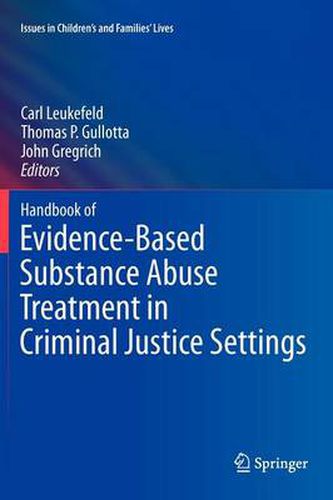Readings Newsletter
Become a Readings Member to make your shopping experience even easier.
Sign in or sign up for free!
You’re not far away from qualifying for FREE standard shipping within Australia
You’ve qualified for FREE standard shipping within Australia
The cart is loading…






This title is printed to order. This book may have been self-published. If so, we cannot guarantee the quality of the content. In the main most books will have gone through the editing process however some may not. We therefore suggest that you be aware of this before ordering this book. If in doubt check either the author or publisher’s details as we are unable to accept any returns unless they are faulty. Please contact us if you have any questions.
Get high. Become addicted. Commit crimes. Get arrested and be sent to jail. Get released. Repeat. It’s a cycle often destined to persist, in large part because the critical step that is often missing in the process, which is treatment geared toward ensuring that addicts are able to reenter society without the constant threat of imminent relapse.
The Handbook of Evidence-Based Substance Abuse Treatment in Criminal Justice Setting probes the efficacy of corrections-based drug interventions, particularly behavioral treatment. With straightforward interpretation of data that reveals what works, what doesn’t, and what needs further study, this volume navigates readers through the criminal justice system, the history of drug treatment for offenders, and the practical problems of program design and implementation. Probation and parole issues as well as concerns specific to special populations such as women, juvenile offenders, and inmates living with HIV/AIDS are also examined in detail.
The Handbook’s wide-ranging coverage includes:
Biology and genetics of the addicted brain. Case management for substance-abusing offenders. Integrated treatment for drug abuse and mental illness.
Evidence-based responses to impaired driving. Monitoring technology and alternatives to incarceration. The use of pharmacotherapy in rehabilitation.
This must-have reference work is a comprehensive and timely resource for clinicians, researchers, and graduate students across a variety of disciplines including clinical psychology, criminology and criminal justice, counseling, and educational policy makers.
$9.00 standard shipping within Australia
FREE standard shipping within Australia for orders over $100.00
Express & International shipping calculated at checkout
This title is printed to order. This book may have been self-published. If so, we cannot guarantee the quality of the content. In the main most books will have gone through the editing process however some may not. We therefore suggest that you be aware of this before ordering this book. If in doubt check either the author or publisher’s details as we are unable to accept any returns unless they are faulty. Please contact us if you have any questions.
Get high. Become addicted. Commit crimes. Get arrested and be sent to jail. Get released. Repeat. It’s a cycle often destined to persist, in large part because the critical step that is often missing in the process, which is treatment geared toward ensuring that addicts are able to reenter society without the constant threat of imminent relapse.
The Handbook of Evidence-Based Substance Abuse Treatment in Criminal Justice Setting probes the efficacy of corrections-based drug interventions, particularly behavioral treatment. With straightforward interpretation of data that reveals what works, what doesn’t, and what needs further study, this volume navigates readers through the criminal justice system, the history of drug treatment for offenders, and the practical problems of program design and implementation. Probation and parole issues as well as concerns specific to special populations such as women, juvenile offenders, and inmates living with HIV/AIDS are also examined in detail.
The Handbook’s wide-ranging coverage includes:
Biology and genetics of the addicted brain. Case management for substance-abusing offenders. Integrated treatment for drug abuse and mental illness.
Evidence-based responses to impaired driving. Monitoring technology and alternatives to incarceration. The use of pharmacotherapy in rehabilitation.
This must-have reference work is a comprehensive and timely resource for clinicians, researchers, and graduate students across a variety of disciplines including clinical psychology, criminology and criminal justice, counseling, and educational policy makers.